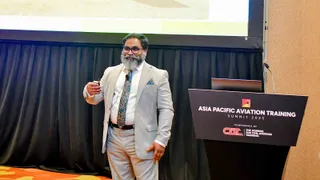Gulf Aviation Academy – Reaching Out
Contact Our Team
For more information about how Halldale can add value to your marketing and promotional campaigns or to discuss event exhibitor and sponsorship opportunities, contact our team to find out more
The Americas -
holly.foster@halldale.com
Rest of World -
jeremy@halldale.com

Offering training in Bahrain and the Middle East Northern Africa region, Gulf Aviation Academy is going from strength to strength. Chris Long reports.
The origins of the Gulf Aviation Academy (GAA) go back to the training support for Gulf Air, but, as Capt. Dhaffer AlAbbasi, CEO, explains, the potential to reach out to a broader range of customers resulted in the GAA establishing itself as an independent training provider in 2010.
Training for Gulf Air has continued, but that work now represents just 20% of the training task, and the successful expansion has meant that the remaining 80% has moved to a wide-ranging customer base. Initially this focussed on the Middle East and North Africa (MENA) market, but this has now been extended to other regions, including India, Pakistan, Eastern Europe and beyond.
A recent customer is a legacy European major airline, so not only has the geographical reach grown, but the range of training available has also broadened. Originally principally engaged in pilot training using full-flight simulators (FFS) and lead-in flight training devices (FTDs), the GAA has many other disciplines in the line-up. With the aim of providing a one-stop option for airlines, in particular for the flood of start-ups, the courses can now cover cabin crew and technician teams, dispatchers, airport staff and air traffic controllers. The centre is also approved as an ICAO Aviation Security Training Centre (ASTC) and also provides UK CAAi International Programmes on a wide range of specialisations.
Engineering Training
Given the cultural background of Bahrain, it makes it a familiar environment for those from a similar culture, and the difficulties experienced with visas elsewhere may not apply here. The growing route structure facilitates easy access from the majority of the target market. The GAA has not been slow to benefit from these influences, and by means of strong partnerships has built up a wide customer base. For instance, it was the first authorized training organisation (ATO) outside Europe to have European Aviation Safety Agency (EASA) approval for pilot training, with Certificate 0001. In 2019 GAA joined with AFI KLM training E&M to offer part 147 Type Training on the B737 NG/MAX, B777, B787 and other types.
Pilot Training
With three A320 and one A330 FFSs in place, and with tenders now being opened for a fourth A320, there is an indicator of what market is being addressed. In a deliberate response to bring training closer to the market, the Embraer 170/190 FFS has been transferred to Amsterdam to position it in the centre of the area where there are more operators of that type.
Local training airspace is limited, so ab initio pilot training is now carried out in partnership with Airways Aviation, where training approval has been granted by EASA, CASA of Australia and the CAA of Montenegro. This is delivered at a fair-weather base in Huesca, Spain, and follows a thorough selection process which uses the Compass Aptitude Test as a primary selection tool. Some 20-30 students per year follow the modular CPL/IR “Frozen” ATPL pattern, and so far, 90 pilots have graduated, and all have jobs with Gulf Air and other airlines from the GCC region. Another 24 have completed an MPL course which has been designed for Air Arabia.
Other newly licensed pilots can enter a scheme which provides them with 1,000 productive hours to build experience. These second officers have to fund this operating experience themselves, but it is a way to accumulate credible operational hours and should prepare them for rewarding airline jobs.
Cabin Crew
All cabin crew requirements for formal accreditation can be carried out at the GAA, so both initial and recurrent training are completed here; this both for airlines and individuals.
Air Traffic Controller Training
The demand for competent air traffic controllers is growing, particularly in the region, so the convenience of completing both Local and Area controller qualifications nearby is very attractive to that market.
Steady Growth
Encouraged by the response to a broad range of training offerings, Capt. AlAbbasi foresees significant further expansion, both in scale and geographic reach to bring training closer to the customers. The meteoric rise in global demand for aviation professionals means that there is plenty of demand for competent training, and AlAbbasi is determined that the GAA will help to meet that.
Published in CAT issue 3/2019


